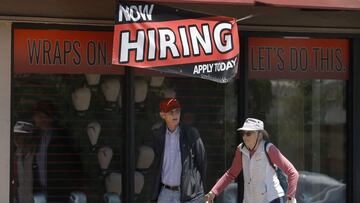What states have ended federal unemployment benefits and are more people working?
25 states have cut at least the federal $300 booster to unemployment benefit early, if not all pandemic benefits, only 15 saw significant job growth.

The US Bureau of Labor Statistics released its report on state employment numbers on Friday showing that half the states had job growth, while one lost jobs from May to June. The remaining states and the District of Columbia saw no significant change in employment.
All but two of the states that announced they would end one or all of the federal pandemic employment programs early have now done so, while one has reinstated them under court order. Despite jobless claims falling in states that have ended the federal programs, the expansion of new hires is still lagging in nine of them and Alaska lost 2,700 jobs last month.
Also see:
- June unemployment data shows increases in states cutting federal benefits
- States back down after unemployment benefits lawsuits
- What are the restrictions with California's reinstated mask mandate?
- Is there a limit of children a family can claim for the $3,000 to $3,600 Child Tax Credit?
Ending federal unemployment benefits early doesn’t necessarily mean more jobs
The most jobs were gained in Florida with 81,300 new jobs, followed by California, 73,500, and Texas, 55,800. Both Florida and Texas ended participation in the extra $300 on top of other unemployment compensation 26 June. Texas, which was sued by state workers on unemployment insurance, cancelled all other federal pandemic programs as well. However, in the case of California, those receiving federal benefits will continue to do so until they expire early September.
The largest percentage in job gains of 1.3 percent was again led by a state that cut unemployment benefits early, but with a twist. Arizona, which ended only the $300 weekly booster 10 July, offered its residents receiving unemployment benefits a bonus of up to $2,000 if they went back to work. But right on its heels with a 1.2 percent increase in jobs was its neighbor Nevada which is keeping the all federal out of work benefits until September.
Both Florida and North Carolina tied for third place adding 0.9 percent more employment in June. However, the governors of two states have differing opinions about the federal pandemic unemployment benefits. North Carolina Governor Roy Cooper was presented with a bill from the Republican-controlled Legislature that would have ended the federal assistance early but on 3 July the governor vetoed the bill.
Democratic Gov. Roy Cooper vetoed legislation Friday that would have ended additional federal benefits created during the pandemic for North Carolina’s unemployed before the program expires nationwide. https://t.co/NBDtu9WKLx
— WUNC (@wunc) July 2, 2021
For the other twelve states which chose to opt out of the federal programs early and that saw job growth, they saw an average of around 0.6 percent growth in jobs. Those states included Alabama, Georgia, Idaho, Indiana, Mississippi, Nebraska, Ohio, Oklahoma, Utah, West Virginia. This was better on average than the eight other states; Colorado, Hawaii, Kansas, Michigan, New Jersey, Oregon, Washington, Wisconsin, that will keep the unemployment benefits until they expire in September which saw an average of 0.46 percent increase in employment.
What states are ending benefits?
There are a total of twenty-six states that have chosen to end federal pandemic unemployment benefits but some are now doing an about-face and have resumed payments after being sued by residents.
Maryland, although it was scheduled to end benefits 3 July continued the payments after a court found that Governor Larry Hogan had overstepped his authority in ordering them to stop. The governor has now decided not to fight the court decision and allow those benefits to continue until they expire.
Indiana restarts pandemic unemployment benefits after judge's order https://t.co/uhIRzfOyYz
— CNN Politics (@CNNPolitics) July 16, 2021
A similar situation occurred in Indiana where pandemic benefits were canceled 19 June. Workers in the state were the first to file a lawsuit against their governor Eric Holcomb for his executive action and win a restraining order. The judge in this case said that it appeared the governor had broken state law when he took Indiana out of the federal pandemic unemployment programs. The judge had ordered the payments to resume but out of work residents had to wait until 16 July after a state Court of Appeals upheld that decision last week requiring the state to restart paying federal unemployment compensation.
Related stories
Louisiana will be the last state to end unemployment benefits early with the stop date scheduled for the end of July. The remaining states that are no longer participating in one or all of the federal programs include:
Alabama, Alaska, Arizona, Arkansas, Florida, Georgia, Idaho, Iowa, Mississippi, Missouri, Montana, Nebraska, New Hampshire, North Dakota, Ohio, Oklahoma, South Carolina, South Dakota, Tennessee, Texas, Utah, West Virginia, and Wyoming.
- Court order
- North Caroline
- Arizona
- Indiana
- Unemployment compensation
- Covid-19 economic crisis
- Science
- California
- Texas
- Florida
- Unemployment
- Coronavirus Covid-19
- Economic crisis
- United States
- Pandemic
- Coronavirus
- North America
- Employment
- Sentences
- Economic climate
- Virology
- Outbreak
- Infectious diseases
- Suspensions
- Diseases
- Medicine
- Work
- Court case
- Economy
- Biology
- Health
- Justice
- Life sciences
- Trials


